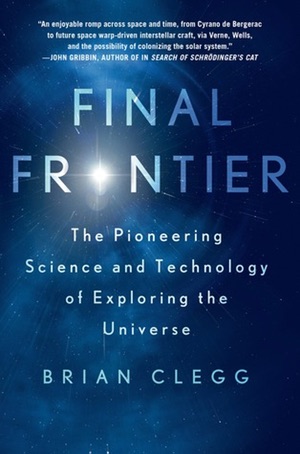Review: Final Frontierby Jeff Foust
|
| Given the book’s modest length, it’s not surprising that Clegg doesn’t go into any great detail about any of these topics. |
In that context, a guide to those technologies needed for human and robotic space exploration, and why they’re needed, may be useful for many people. At first glance, the book Final Frontier: The Pioneering Science and Technology of Exploring the Universe, by Brian Clegg, appears to be that guide. However, the book is instead a fairly broad and superficial overview of commercial and government spaceflight efforts from Earth orbit to beyond the solar system.
Like many other authors have done, Clegg works the reader from the Earth out into the universe over the course of the book. After some historical background, Clegg covers the challenges of getting into space, then what’s needed to go to the Moon, Mars, and asteroids, and what people or robots would do there. He rounds out the book by reviewing the issues associated with interstellar travel, be it with robotic spacecraft that take tens of thousands of years to reach the nearest stars, or experiments with “warp drive” concepts.
Given the book’s modest length (about 265 pages, excluding its endnotes and index, although curiously without any images), it’s not surprising that Clegg doesn’t go into any great detail about any of these topics. If you’re a regular reader of this publication, or others like it, you probably won’t learn much new, as he covers familiar ground on issues as wide ranging as terraforming Mars to asteroid mining to keeping an interstellar empire together. Clegg mixes in some science fiction references to liven up the text, but the level of detail of the book relatively shallow, at least for those already familiar with the challenges of space exploration.
| “But, as much as I love science, I have come to realize that space exploration is not about the science,” he writes. “Opening up the new frontier, exploring space, is a fundamental requirement for the future.” |
Clegg, though, doesn’t always get even those basic details right. For example, when discussing President Kennedy’s famous 1961 speech, he writes, “The most famous line that is often remembered from the speech, pledging a manned landing on the Moon in the 1960s, doesn’t actually exist.” Of course, though, it does: “I believe that this nation should commit itself to achieving the goal, before this decade is out, of landing a man on the Moon and returning him safely to the Earth.” Clegg, it appears, confused that speech before a joint session of Congress with one Kennedy delivered at Rice University in September 1962.
At the end of Final Frontier, Clegg does offer a bit of a revelation: his own views about spaceflight changed during the course of writing the book. When he started the book, he said he believed that there was little use for humans in space; robots could accomplish great science for far less money. “But, as much as I love science, I have come to realize that space exploration is not about the science,” he writes. “Opening up the new frontier, exploring space, is a fundamental requirement for the future” of humanity, he concludes.
That revelation isn’t necessarily a novel one, but it is an important one, and to hold it off until the end is something of a disappointment. For all the love of space science and technology among both aficionados and the general public, the real challenge remains constructing rationales for spaceflight, particularly involving humans, that can be sustained over the long haul. (Indeed, Clegg laments from time to time in the book that political inability, but doesn’t explore it in deeper detail.) That’s where the real pioneering remains to be done.
